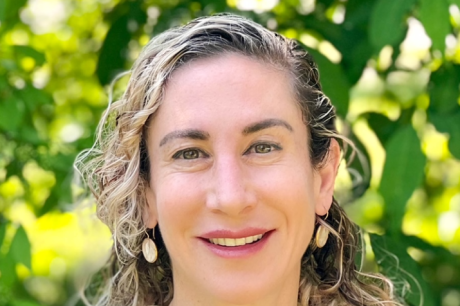
Turner and Platt meet with Dr. Maselko.
Published June 12, 2012, last updated on February 19, 2013 under Research News
A new initiative is in full swing at the Duke Global Health Institute that integrates biostatisticians specialized in global health into all aspects of research.
With the goal of building long-lasting collaborations in global health research, biostatisticians Liz Turner and Alyssa Platt bring expertise to DGHI as part of the new DGHI Biostatistics Core. Turner and Platt are now collaborating with DGHI faculty and affiliate members across the research spectrum, from formulating the research question and developing study design to analyzing and communicating research findings.
“Research is a critical part of what we do here at the Duke Global Health Institute,” said Turner. “Good research not only relies on appropriate statistical methods, but on well-designed studies that produce valid and reliable data. As biostatisticians, we are here to work with faculty members at any and all stages of their research.”
“As the Institute continues to grow, as more grants are written and more research projects get under way, we hope this collaboration will be a great added benefit to our faculty,” said John Bartlett, DGHI associate director for research. “We are excited to have Liz and Alyssa join our team.”
Turner, also a DGHI Medical Instructor, joined DGHI and the Duke Department of Biostatistics and Bioinformatics in March. With a PhD in statistics from McGill University and previous work as a biostatistician at the London School of Hygiene and Tropical Medicine, Turner has extensive experience with both epidemiological studies and randomized trials across a range of topic areas in resource-poor settings. Her research interests include malaria, cardiovascular disease and mental health, and the development of statistical methods to estimate disease burden. She strives to communicate complex statistical concepts in a clear and useful way.
Platt came to DGHI and the Duke Department of Biostatistics and Bioinformatics in February. She received a MA in applied economics from Duke and spent the last four years working in the field of health economics in the Duke Department of Economics, giving her a range of experience in health behaviors and health outcomes. Platt’s interests include health behavior and access to care, risk behavior and economic development. She also has a growing interest in the use of spatial methods to determine environmental correlates of health and disease risk.
To request a meeting, faculty members should complete an online request form. Staff members, postdoctoral trainees and students are able to submit the form on a faculty member’s behalf. Turner and Platt are available at 234 Trent Hall for in-person consultations, which are preferred. For DGHI faculty outside of the US, consultations are available via Skype.

